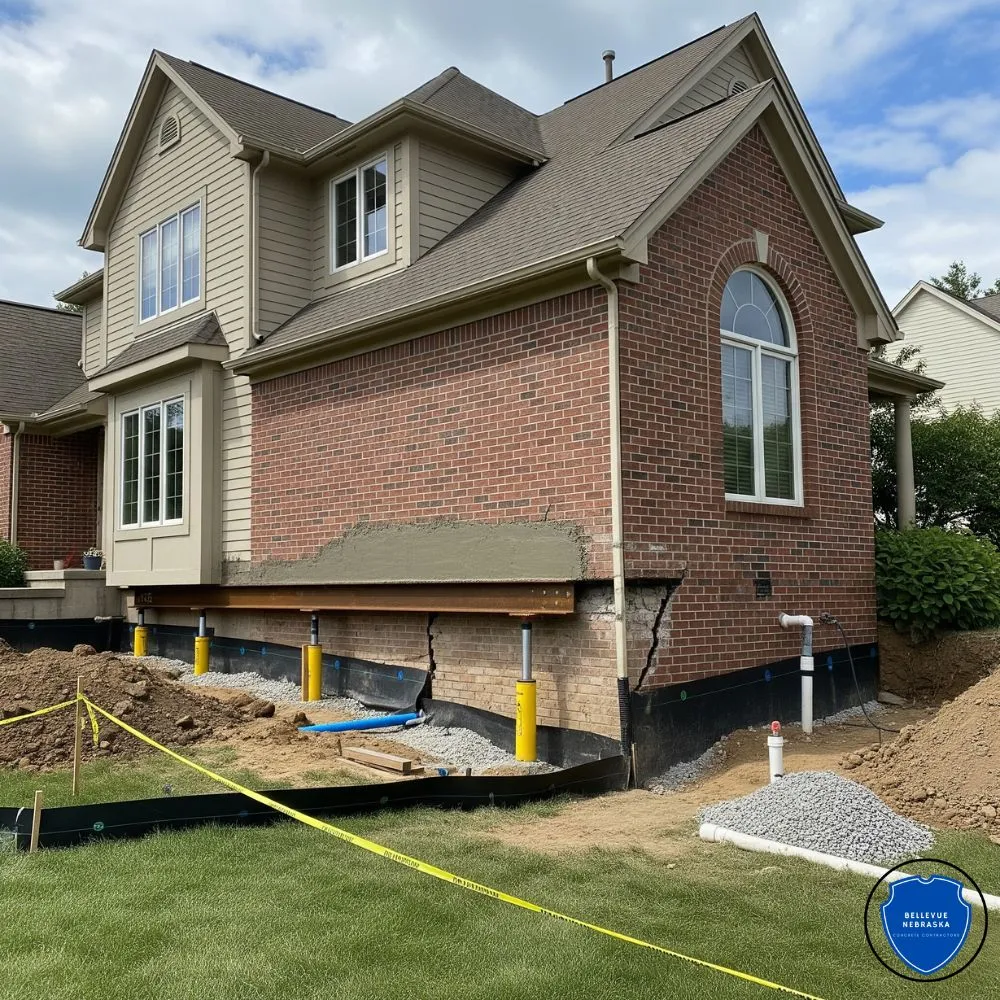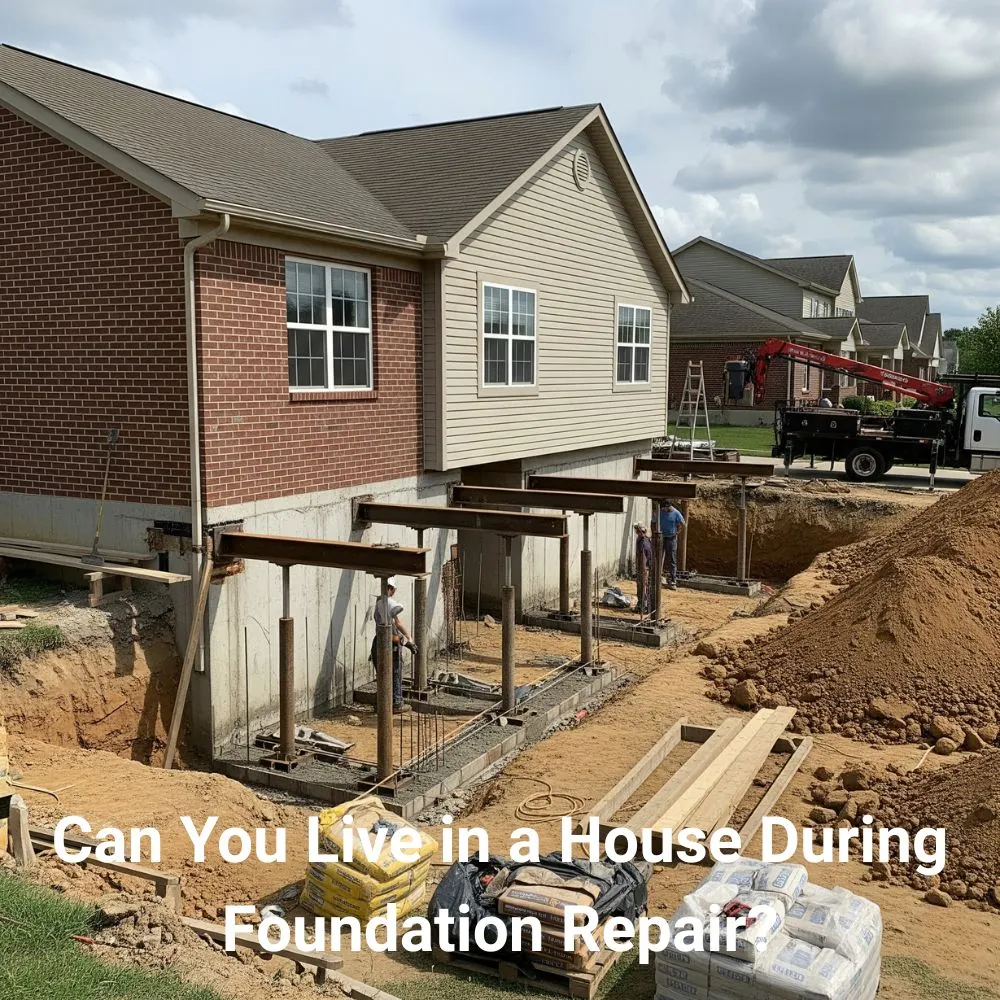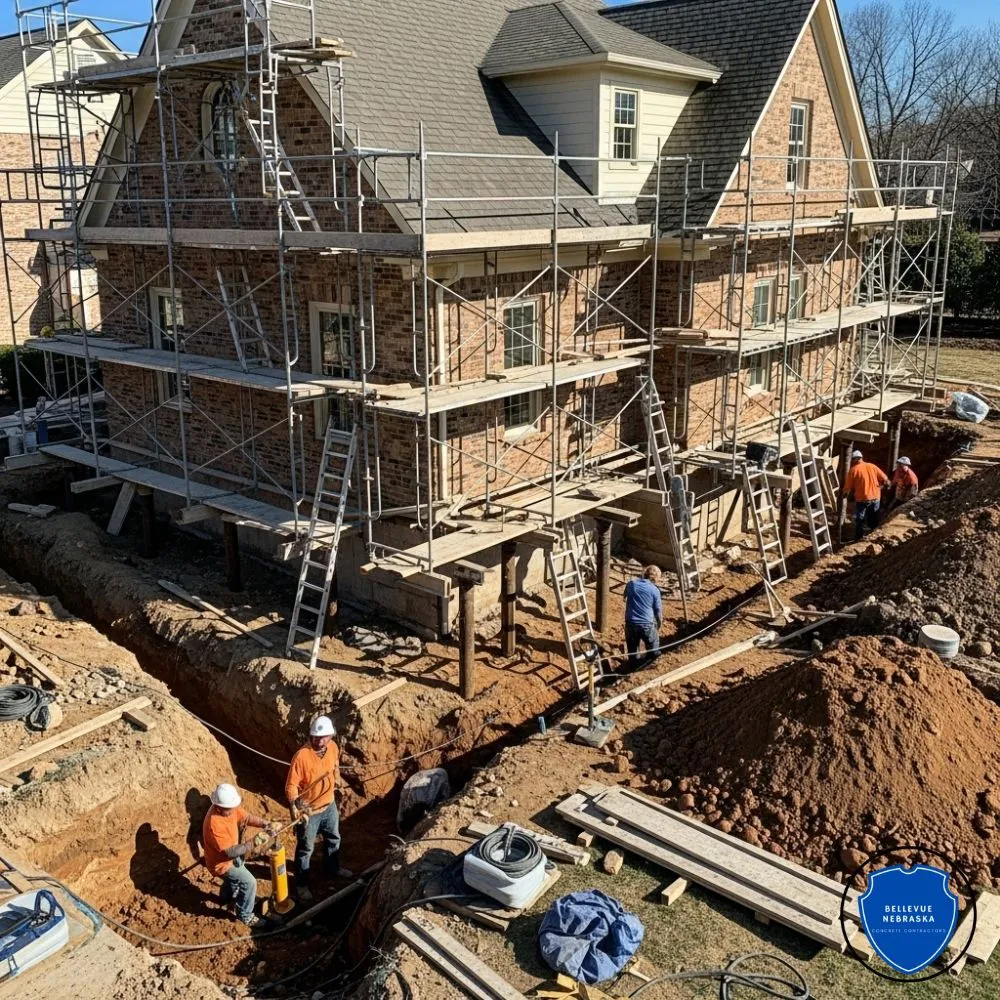Living in a house while foundation repair is underway can be stressful, but it’s often possible. You can stay in your home during many types of foundation repair, depending on the work being done.
Some repairs are light and cause minimal disruption. Others involve serious structural work that may require you to leave for a short time. Your contractor can help you make the right choice.
In this blog, you’ll learn what foundation repair involves, when it’s safe to stay, and when it’s better to be out of the house.
What Foundation Repair Involves
Foundation repair is the process of fixing issues that affect the base of your home. It helps prevent serious structural problems and keeps your house stable and safe. Different homes need different solutions depending on the cause and severity of the damage.
Common foundation repair methods include:
- Slabjacking: lifting a sunken concrete slab by pumping material underneath, often used to raise concrete over concrete without replacing the original surface
- Piering: using steel or concrete piers to stabilize the foundation
- Sealants and waterproofing: for minor cracks or moisture issues
- Wall anchors or braces: to support bowed or cracked walls
- Drainage correction: to fix water problems that affect the foundation
Is It Safe to Stay in Your Home During Repairs?
Staying home during foundation repair is often safe, but it depends on the type of work being done. Minor repairs, such as filling small cracks or sealing areas, typically allow you to stay in place without much disruption. However, larger jobs may involve the use of tools, dust, noise, and limited access to certain parts of your home.
There are some risks to consider. Vibrations from heavy machinery can be loud and unsettling. Dust or fumes can affect indoor air quality, particularly for children, older adults, or individuals with respiratory issues. Contractors may also need to cut off water or electricity temporarily.
If you choose to stay, take safety steps. Keep children and pets away from work zones. Close doors to rooms not in use. Ask your contractor how the work will affect your routine. In many cases, staying is fine if you stay alert and communicate clearly with the crew.
When You Might Need to Move Out Temporarily

In some cases, staying home during foundation repair is not the best option. If safety, health, or access become serious concerns, it may be better to move out for a while.
Major Structural Repairs
If the foundation work involves lifting the house, replacing footings, or using large equipment, it’s safer to be elsewhere. These repairs can cause strong vibrations, loud noise, and even temporary instability. Contractors may need to cut off utilities or block entrances to complete the job. In such situations, leaving ensures your safety and gives the crew more room to work efficiently without delays.
Health and Air Quality Issues
Some foundation repairs create dust, fumes, or mold exposure, especially in older homes. If you or a family member has asthma, allergies, or a weakened immune system, leaving the house may be the best choice. Good air circulation and proper sealing help, but they don’t always remove all risks. A short move can protect your health during the messiest parts of the job.
What to Expect Day-to-Day if You Stay Home
Daily life during foundation repair can feel a bit unsettled. While many contractors do their best to reduce disruption, you’ll still notice some changes. Knowing what to expect helps you plan and stay comfortable at work. Most of the disturbance happens during working hours, with quieter evenings and weekends.
- Expect loud drilling, hammering, and motor noise during the day
- You may feel minor to strong vibrations depending on the method used
- Contractors might block access to certain rooms or hallways
- Your driveway or yard could be partially closed off
- Tools and materials may be stored on-site throughout the project
- Workers often start early and finish by late afternoon
- Crews usually communicate schedules clearly and try to avoid interrupting key routines
- Pets and small children should be kept away from work zones
How Long Does Foundation Repair Typically Take?

The time required for foundation repair depends on the type and severity of the problem. Small fixes like filling cracks or sealing joints can take one or two days. More involved repairs, such as slabjacking or pier installation, often take about three to seven days.
If your home needs major structural work, the process might stretch to two weeks or longer. Weather delays and permit issues can also add extra time. Your contractor should give you a clear estimate before work begins and update you if things change. Planning for the longest expected time helps reduce stress and keeps your schedule flexible while repairs are underway.
Talking to Your Contractor About Staying Home
Before the work begins, speak openly with your foundation repair contractor about staying in your home. Good communication helps prevent surprises and keeps you informed throughout the project.
Ask what areas of the house will be affected, how loud the work will be, and whether any utilities will be shut off. You should also confirm the work hours, how long the job will take, and what safety steps are needed.
Ensure to mention any health concerns, pets, or young children in the home. Contractors can often adjust their work schedule or methods to reduce disruption. Also, ask about dust control, indoor air quality, and access to your kitchen or bathroom.
A clear conversation at the start leads to better planning and fewer issues. If you’re unsure whether staying home is a good idea, your contractor can help you decide based on your home’s condition and the type of repair needed.
Conclusion
Deciding to stay home during foundation repair depends on several factors. If the job is minor and safety risks are low, staying home can be both convenient and cost-effective. On the other hand, major repairs may involve noise, dust, and blocked rooms, making it hard to go about your day. Your comfort, health, and schedule all matter.
Talk to your contractor early, ask questions, and plan ahead. A little preparation helps you decide what’s right for your situation. Staying or stepping away, knowing what to expect, will make the experience smoother and less stressful.
Frequently Asked Questions
Can I use my kitchen and bathroom during repairs?
In most cases, yes. However, access may be limited for short periods depending on where the work is being done.
Is it safe to park my car in the driveway during the repair?
It’s best to move your car. Contractors may need space for tools, equipment, or large vehicles.
Will my floors crack during foundation work?
Minor cracks can occur, especially with lifting or leveling. Contractors try to minimize this, but it’s a possible side effect.
Will furniture inside the home be affected?
Not directly, but it’s smart to remove fragile items from walls and shelves to avoid damage from vibrations.



